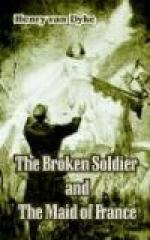“Well, then, I am from the parish of Laucourt, in the pleasant country of the Barrois not far from Bar-sur-Aube. My faith, but that is a pretty land, full of orchards and berry-gardens! Our old farm there is one of the prettiest and one of the best, though it is small. It was hard to leave it when the call to the colors came, two years ago. But I was glad to go. My heart was high and strong for France. I was in the Nth Infantry. We were in the center division under General Foch at the battle of the Marne. Fichtre! but that was fierce fighting! And what a general! He did not know how to spell ‘defeat.’ He wrote it’ victory.’ Four times we went across that cursed Marsh of Saint-Gond. The dried mud was trampled full of dead bodies. The trickling streams of water ran red. Four times we were thrown back by the Boches. You would have thought that was enough. But the general did not think so. We went over again on the fifth day, and that time we stayed. The Germans could not stand against us. They broke and ran. The roads where we chased them were full of empty wine-bottles. In one village we caught three officers and a dozen men dead drunk. Bigre! what a fine joke!”
Pierre, leaning back upon his heels, was losing himself in his recital. His face lighted up, his hands were waving. Father Courcy bent forward with shining eyes.
“Continue,” he cried. “This is a beautiful confession—no sin yet. Continue, Pierre.”
“Well, then, after that we were fighting here and there, on the Aisne, on the Ailette, everywhere. Always the same story—Germans rolling down on us in flood, green-gray waves. But the foam on them was fire and steel. The shells of the barrage swept us like hailstones. We waited, waited in our trenches, till the green-gray mob was near enough. Then the word came. Sapristi! We let loose with mitrailleuse, rifle, field-gun, everything that would throw death. It did not seem like fighting with men. It was like trying to stop a monstrous thing, a huge, terrible mass that was rushing on to overwhelm us. The waves tumbled and broke before they reached us. Sometimes they fell flat. Sometimes they turned and rushed the other way. It was wild, wild, like a change of the wind and tide in a storm, everything torn and confused. Then perhaps the word came to go over the top and at them. That was furious. That was fighting with men, for sure—bayonet, revolver, rifle-butt, knife, anything that would kill. Often I sickened at the blood and the horror of it. But something inside of me shouted: ’Fight on! It is for France. It is for “L’Alouette,” thy farm; for thy wife, thy little ones. Wilt thou let them be ruined by those beasts of Boches? What are they doing here on French soil? Brigands, butchers, Apaches! Drive them out; and if they will not go, kill them so they can do no more shameful deeds. Fight on!’ So I killed all I could.”
The priest nodded his head grimly. “You were right, Pierre; your voice spoke true. It was a dreadful duty that you were doing. The Gospel tells us, if we are smitten on one cheek we must turn the other. But it does not tell us to turn the cheek of a little child, of the woman we love, of the country we belong to. No! that would be disgraceful, wicked, un-Christian. It would be to betray the innocent! Continue, my son.”




